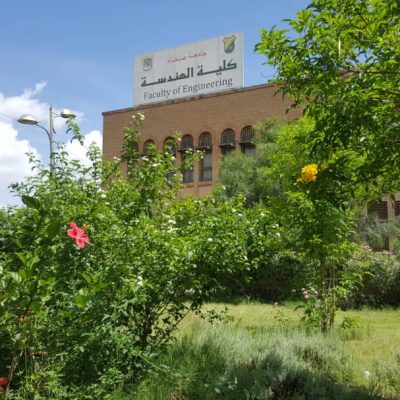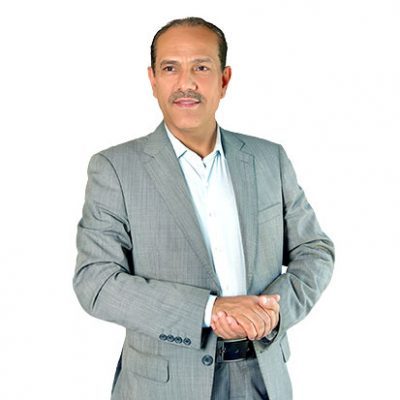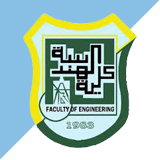About the Faculty
Faculty of Engineering

Faculty of Engineering
The Faculty of Engineering was established in 1983, based on Sana’a University Rector’s Resolution No. (52), for the year 1982, issued on 26-07-1982. The Faculty is considered one of the significant achievements at the national level and one of the most important technical faculties at the University, as it provides both public and private sectors with qualified engineers who meet the requirements of sustainable development, and the needs of the labor market. Thus, it reduces public expenditures on external scholarship programs.
Upon the establishment of the Faculty, the Department of Civil Engineering was established as the first academic department in the Faculty. It started teaching a civil engineering program, which is one of the oldest and largest programs in the Faculty. It was followed by further steps to form some other departments that offer new academic programs. The Department of Electrical Engineering was formed in 1984. It included three programs: Electrical Power Engineering Program, Communications and Networks Engineering Program, and Computer and Control Engineering Program. The Department of Architecture was founded in 1986. It included an Architecture Program. The Department of Mechanical Engineering was founded in 1993 to provide a Mechanical Engineering Program. In 2012, one of the most important modern scientific departments was established, i.e. the Department of Mechatronics Engineering. It provides a program of Mechatronics Engineering in accordance with the visions of both the University and the Faculty in order to meet the requirements of development as well as the labor market and its rapid improvements. The Department of Biomedical Engineering has been established and operated recently in the year 2020. It provides a Biomedical Engineering Program. The Faculty of Engineering at Sana’a University is the only public faculty that conducts such a very important academic scientific program, where the biomedical engineering professionals get qualified to meet the needs of development and the labor market requirements. The faculty also includes another qualitative department, i.e. the Department of Basic Engineering Sciences, which is in charge of teaching the faculty-specific requirement courses such as mathematics, physics, chemical engineering etc., in addition to the University General Requirement courses such as Arabic, English and computer courses.
The Faculty employs more than 80 professors holding PhDs in various engineering disciplines from prestigious and well-known international universities, in addition to dozens of teaching assistants, including assistant lecturers, teaching assistants, engineers and technicians. The number of students enrolled in all the Faculty programs is between 3,500 to 4,000 students, of whom about 400 to 450 male and female engineers graduate every academic year.
The Faculty started to offer postgraduate programs (Master Degree Programs) in Civil Engineering, Electrical Engineering and Architecture about twenty years ago. In 2020 and 2021, the specification documents of the Master Degree Programs have been revised and updated to include some more typical Master’s programs in Structural Engineering, Roads and Geotechnical Engineering, Water and Environmental Engineering, Management of Engineering Projects, Electrical Power Engineering, Communications and Networks Engineering, Computer and Control Engineering, Architecture, Mechanical Engineering, and Mechatronics Engineering. Preparations are also underway to open three PhD programs in the current year 2021 including: PhD in Civil Engineering, PhD in Electrical Engineering, and PhD in Architecture.
Dean's message
The Faculty of Engineering at Sana’a University, which was established in 1983, is considered one of the most important and earliest scientific engineering colleges in the Republic of Yemen. It provides the public and private sectors and institutions with qualified cadres to meet the needs of development and labor market requirements of the various engineering fields, including construction, roads, bridges, geo-technics, dams, water & environment, electricity, renewable energy, electric power and machinery, communications and networks, computers, control systems, production and manufacturing, engineering materials, air conditioning and refrigeration, power engines, automation of production lines, mechatronics, architectural design, urban planning and biomedical engineering. Graduates are qualified through modern and developed academic programs. The number of enrolled students at the Faculty is between 3,500 and 4,000 students, in all scientific departments. About 400 to 450 engineers graduate from the Faculty each academic year. The Faculty employs more than 80 professors holding PhDs in various engineering disciplines from prestigious and distinguished international universities, in addition to dozens of teaching assistants, including assistant lecturers, teaching assistants, engineers and technicians.
Based on the vision and mission of the Faculty offers distinguished and accredited engineering programs that go in line with the needs of development and the requirements of the local and regional labor market. Through its academic programs and study plans, the Faculty prepares and qualifies students to be engineers of high quality, providing them with theoretical and practical scientific knowledge over a period of five academic years. In the final year, students are required to successfully execute an engineering project, i.e. the graduation project, which is taught over two full semesters. This graduation project is considered a culmination of the knowledge, experiences and skills that the student learned and acquired during his/her scientific career in the Faculty. Students of the Faculty of Engineering, over its long history, are distinguished by creativity in the design and implementation of wonderful engineering projects that present engineering ideas, designs, plans, studies and solutions to many of the problems and obstacles facing the various sectors of the labor market. The Faculty is always keen and calls for the need for integration between educational and research institutions and the various beneficiaries of the state and private institutions. Such integration is very important to better respond to issues facing sustainable development and national industries. The Faculty runs an engineering consulting center that provides studies and both technical and engineering consultancy services. The center is the assisting hand extended by the Faculty towards community services.
The Faculty offers many postgraduate programs (Master Degree Programs) in Civil Engineering, Electrical Engineering and Architecture, which started about twenty years ago. In 2020 and 2021, the specification documents of the Master Degree Programs have been revised and updated to include some more typical Master’s programs in: Structural Engineering, Roads and Geotechnical Engineering, Water and Environmental Engineering, Management of Engineering Projects, Electrical Power Engineering, Communications and Networks Engineering, Computer and Control Engineering, Architecture, Mechanical Engineering, and Mechatronics Engineering. During this year 2021, preparations are also being made to open three PhD programs including PhD in Civil Engineering, PhD in Electrical Engineering, and PhD in Architecture. Besides, the Faculty publishes a peer-reviewed scientific journal holding an International Standard Serial Number (ISSN).
In the last seven years, the Faculty conducted dozens of programs, projects, workshops, activities, events and training courses, which resulted in updating the specifications documents of all its academic programs to meet the needs of development and the labor market. Furthermore, it has fully automated and computerized its routine works, including the students’ affairs and the other academic, financial and administrative activities. Several qualitative units have been introduced into the Faculty such as the Information Systems and Technology Unit, the Quality Unit, a modern website, a modern and advanced electronic library, which is linked to dozens of international publishers to enable researchers, graduates and undergraduate students to obtain research works published in hundreds of scholarly journals and periodicals in various engineering disciplines. Although the Faculty has a good physical and laboratory infrastructure, it still needs significant support and funding to modernize and develop its infrastructure and laboratories. This is the goal that the Deanship of the Faculty seeks and is constantly working on to achieve through all available means.
Dean of the Faculty
Professor/ Mohammad Ahmed Al Bokhaiti

Latest News
Faculty of Engineering
Alumni
Faculty of Engineering
Published Research
Faculty of Engineering
College and Society
Faculty of Engineering

